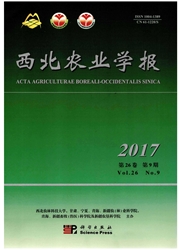

 中文摘要:
中文摘要:
以3种不同盐碱化水稻土(吉林、宁夏和天津)为材料,采用土壤泥浆厌氧培养法,通过对添加不同用量生物炭的培养体系中游离碳酸盐质量摩尔浓度、pH、脱氢酶活性及Fe(II) 质量分数的变化趋势分析,以期验证生物炭在减弱土壤盐渍化过程中的贡献及进行必要的机理探讨。结果表明:生物炭能够促进碳酸盐的溶出,在吉林、宁夏和天津3种水稻土中添加生物炭后,碳酸盐的溶出量较CK分别增长0.405~1.590、0.894~3.592、0.725~2.278 μmol/g,且碳酸盐的溶出量随生物炭用量的增加而升高;添加生物炭对体系脱氢酶活性具有显著促进作用,3种土壤中脱氢酶活性较CK分别增加6.53~15.45、1.76~4.25和8.81~21.13 μg/(mL·g·min);土壤pH在淹水过程均有降低,但由于土壤的缓冲性导致不同生物炭处理间无显著差异;生物炭的添加显著促进微生物铁还原进程,3种水稻土在培养过程中最大铁还原潜势较CK分别增长0.017~0.034、0.088~0.436、0.023~0.437 μg/mL,且生物炭用量与Fe(Ⅱ)质量分数呈正相关。典范对应分析表明,土壤初始pH与碳酸氢盐变化量极显著相关,说明生物炭对碳酸盐溶出量的影响因土壤性质不同而存在差异;吉林和宁夏水稻土各处理差异显著,天津水稻土中,添加生物炭对铁还原过程有促进作用,但生物炭用量的作用差异不明显。推测生物炭通过促进土壤的脱氢-产氢过程进而增加碳酸盐向碳酸氢盐的转化,通过强化微生物铁还原过程增加对碳酸盐的固定。
 英文摘要:
英文摘要:
This study chose three types of saline-alkali paddy soils as tested materials(JL, NX, TJ).With the method of soil slurry anaerobic incubation, the changing trends of carbonate ion content, pH, dehydrogenase activity (DHA) and Fe(Ⅱ) mass fraction were analyzed under the addition of biochar with different amounts, in order to verify the contributions of biochar to mitigate the soil salinization process and explore the mechanisms.The results showed that biochar accelerated the dissolving of carbonate.With the addition of biochar, the carbonate leaching in the three paddy soils increased by 0.405-1.590,0.894-3.592,0.725-2.278 μmol/g compared with CK, respectively.The carbonate leaching was accelerated with the increasing amount of the biochar addition.Biochar enhanced soil DHA significantly.DHA of JL, NX, TJ paddy soils increased by 6.53-15.45,1.76-4.25,8.81-21.13 μg/(mL·g·min) compared with CK, respectively.pH of soils decreased obviously during the incubation, but it showed no significant differences among treatments because of the strong soil buffer ability.Biochar also accelerated the process of microbial iron reduction.Maximum iron reduction potential of the JL, NX,TJ paddy soils increased by 0.017-0.034,0.088-0.436,0.023-0.437 μg/mL compared with CK respectively, and the Fe(Ⅱ) mass fractions were positive correlated with the amount of biochar addition.CCA showed a significant difference between initial pH and the change of bicarbonate, means that the effect of biochar on carbonate dissolution was different due to the variations of soil properties.Each treatment in JL and NX paddy soil showed a significant difference; while in TJ paddy soil, biochar accelerated the iron reduction process, but the effect of the amount of biochar addition is indistinctive.Speculated mechanisms are that biochar accelerated the transformation of carbonate to bicarbonate by promoting the process of dehydrogenation-hydrogen production in soils, and that biochar intensified carbonate fixation by enhancing t
 同期刊论文项目
同期刊论文项目
 同项目期刊论文
同项目期刊论文
 pH shift-mediated dehydrogenation and hydrogen production are responsible for microbial iron(III) re
pH shift-mediated dehydrogenation and hydrogen production are responsible for microbial iron(III) re 期刊信息
期刊信息
